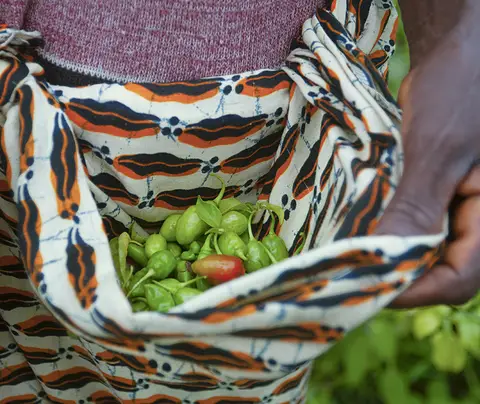Using proven methods the activity will improve agriculture productivity, leading to increased food security, nutrition and resilience
RESEARCH TRIANGLE PARK, NC – RTI International, a nonprofit research institute and leading international development organization, will lead a consortium on a five-year effort to advance agriculture-led economic growth in Liberia, where 70% of the population depends on agriculture for their livelihoods. The Feed the Future Liberia Food Security, Nutrition and Resilience (FSNR) activity funded by the U.S. Agency for International Development (USAID) aims to strengthen agricultural practices, diversify livelihoods, improve market access to year-round nutritious food and increase income gained from agriculture, as part of Feed the Future, the U.S. government’s global hunger and food security initiative.
“FSNR will improve the production, availability, utilization and demand of diverse, nutritious and high-value crops such as orange flesh sweet potatoes, poultry and vegetables,” said Michael Ghebrab, chief of party for FSNR. “To achieve success, FSNR will prioritize the development and sustainability of farmer groups, women’s groups, youth groups and cooperatives to diversify and catalyze agriculture sector growth and improve resilience and access to resources for these groups and the wider communities.”
By taking an inclusive and market-based approach, the activity will reach 15,000 farmers, resulting in increases in income and improved nutritional outcomes for targeted groups over the next five years. FSNR will ensure that climate-smart agriculture approaches are used to enhance resilience to climate-related shocks, while also promoting low-emission agriculture practices to reduce greenhouse gas emissions.
“Our approach to strengthen food security is to make sure the gains we make over the course of the project are sustainable and will not erode after the program ends,” said Nicole Barnes, senior vice president for sustainable growth and resilience at RTI. “Our aim is to improve agricultural practices to increase production and economic opportunities. To do this, we will develop smart agriculture initiatives that are informed by climate science to help farmers and communities adapt to the changing climate.”
RTI is leading the activity with a consortium that includes, BRAC which already has strong relationships operating social development programs in agriculture and food security, GiveDirectly assisting with cash grants to vulnerable women and youth farmers and Dimagi focused on cloud-based agriculture information to enhance extension activities.
Learn more about RTI’s work in food security, agriculture, and nutrition

To request an interview, contact our Media Relations team.
